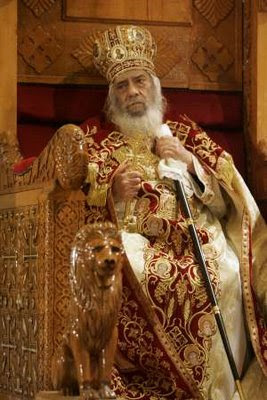+(1).jpg)
The question has never been answered adequately by modern scholarship. I mean -
why was Origen called 'Adamantius'?It wasn't like this was a 'neighborhood nickname.' It wasn't like he was called 'Fonzie' or something of that nature. There must have been some
ritual significance to the name. Just think about it. 'Adamant' was reputed to be the hardest substance in the world; unbreakable like a diamond.
I believe if we piece together this mystery we can not only tie together our argument regarding Origen as the (occultated) Pope who sat on the throne of St. Mark in the cemeteries of Boucolia but also advance our over all case for the authenticity of To Theodore. The problem has always been that scholars don't THINK enough about the facts they regurgitate in academic papers. Above all else, they should understand what they signify and maybe - just maybe - a door will open for them and they will truly understand some wondrous things about our ancient past.
So let's ask the question again - what was the original source for Origen's alter ego 'Adamantius.' No, he wasn't into eighties pop music. It is clearly from Ezekiel's vision comparing the enthroned king of Tyre to Adam. So we read:
You were the model of perfection, full of wisdom and perfect in beauty.
You were in Eden, the garden of God;
Every precious stone adorned you:
Ruby, topaz and emerald, chrysolite, onyx and jasper, sapphire, turquoise and beryl. Your settings and mountings were made of gold,
On the day you were created they were prepared.
You were anointed as a guardian cherub, for so I ordained you.
You were on the holy mount of God; you walked among the fiery stones.
You were blameless in your ways from the day you were created
Till wickedness was found in you.
Through your widespread trade you were filled with violence, and you sinned.
So I drove you in disgrace from the mount of God,
and I expelled you, O guardian cherub, from among the fiery stones.
Your heart became proud, on account of your beauty,
and you corrupted your wisdom because of your splendor.
So I threw you to the earth; I made a spectacle of you before kings. [Ezekiel 28 13 - 19]
In other words, Ezekiel envisions Adam as 'adamantine' in the beginning, created of the hardest elements in the universe - viz. diamonds, precious stones etc (the very stones interestingly enough Moses and the elders see when they behold God's enthroned presence at Horeb).
Is this why the high priests of the Jewish temple had precious stone embroidered into the breast plates of their ritual attire? Yes I certainly think so.
It all goes back to the central Judeo-Christian idea of the restoration of humanity after the fall of Adam. What we fail to realize tucked away in the comfort of our modern ideas is that this was a very real problem for the religious minds of antiquity. It is the very reason people entered the Christian mysteries, why they took part in the flesh and blood of the heavenly man. They wanted to restore themselves to the state that Adam was in before he fell from grace.
Is it at all obvious why grace is such a central concept in the Christian religion? Yet does the reader 'get it' when I say that the Alexandrian Church thought the problem had been solved with Christ?
In any event let's move on. I hope my regular readers will see - Origen was called 'Adamantius' NOT ONLY because he was a 'second Adam' but because his Adamantine nature - his hardness - was an EXAMPLE of the restoration that had been promised since the Fall and realized in the Church of Christ.
In short - he had become an angel thanks to his completion of the Alexandrian mystery ritual established by St. Mark because of his special status as Jesus 'beloved disciple.'
This was the whole point of establishment of the gospel. Notice also that Adam was enthroned, and as we saw the day before yesterday - understood to be a hermaphrodite. What was it Origen did to himself again? ...
+(1).jpg) The question has never been answered adequately by modern scholarship. I mean - why was Origen called 'Adamantius'?It wasn't like this was a 'neighborhood nickname.' It wasn't like he was called 'Fonzie' or something of that nature. There must have been some ritual significance to the name. Just think about it. 'Adamant' was reputed to be the hardest substance in the world; unbreakable like a diamond.
The question has never been answered adequately by modern scholarship. I mean - why was Origen called 'Adamantius'?It wasn't like this was a 'neighborhood nickname.' It wasn't like he was called 'Fonzie' or something of that nature. There must have been some ritual significance to the name. Just think about it. 'Adamant' was reputed to be the hardest substance in the world; unbreakable like a diamond.